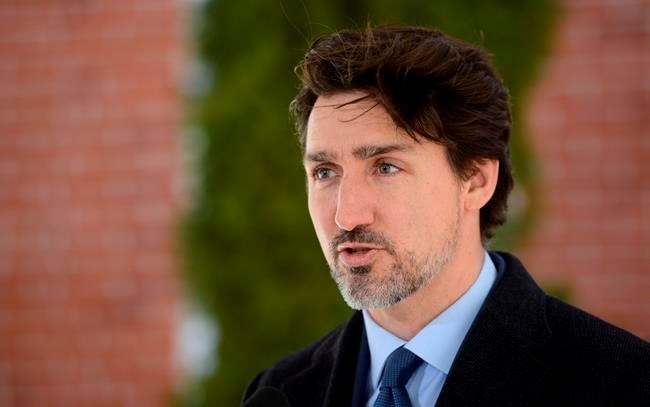OTTAWA — Some provinces and health officials saw glimmers of hope in the country's COVID-19 numbers on Monday, even as the prime minister warned that Canadians shouldn't expect life to return to normal any time soon.
Speaking in Ottawa, Justin Trudeau said officials will have a better idea of how long the crisis will last once models and predictions are developed, but success will depend on how fully Canadians practise distancing habits.
"To stay at home, to continue this period of isolation and distance is the best way to get out as quickly as possible, but certainly it will be a case of several weeks, perhaps several months," the prime minister said in his daily update from Ottawa.
New infections and deaths continued to be reported across the country Monday, with 16,500 total cases and 321 deaths reported by the afternoon.
Dr. Theresa Tam, the country's top public health officer, said she was especially concerned with recent outbreaks in hospitals and long-term care homes, which have been reported in several provinces.
Among the worst of those outbreaks is the Pinecrest Nursing Home in Bobcaygeon, Ont., where three more residents died on Sunday, bringing the total number of COVID-19 deaths at the 65-bed facility to 26.
Tam said that while older people are at a higher risk for complications, people in their 20s have also died, and nobody should consider themselves immune.
But Tam also said there was reason to be optimistic that distancing efforts were working.
She said the case of British Columbia, which has seen its number of new cases decline in the past week, was a reason to believe that collective action could work to slow the pandemic.
"As Canadians, we may not outwardly demonstrate our pride, but our hearts are full of it and we are determined people," she said. "When someone says flatten the curve, we say, 'We'll plank it.'"
Tam also updated guidelines on wearing non-medical masks, amid what she said was increasing evidence that COVID-19 can be transmitted by infected people who have not started to show symptoms or who never fall sick.
As a result, public health authorities have concluded that simple cloth masks can help prevent the wearer from spreading the virus to others in places where physical distancing is difficult, she said.
She said masks worn this way have not been proven to protect the people wearing them, and they don't exempt wearers from other measures they should take against COVID-19, including physical distancing and regular handwashing.
While deaths rose by 13 in Ontario and by 27 in Quebec, officials in both provinces also saw reasons for optimism.
Ontario reported 309 new COVID-19 cases Monday, for a total of 4,347, including 132 deaths and 1,624 patients who have recovered.
The total number of cases reported Monday represented a 7.7 per cent increase over the previous day's total — a lower percentage increase than in previous days.
In Quebec, Premier Francois Legault said there was "light at the end of the tunnel," despite 27 new deaths and a total case count that rose to more than 8,500.
While the province recorded 636 new cases, Legault noted that the numbers appeared to be stabilizing, and the total number of hospitalizations had increased by only eight over the day before.
"If we can have this for a few days, that would mean we are approaching the peak," he told reporters in Quebec City, regarding the rate of infection in the province. "I don't want to speculate, but it's just, the numbers are encouraging today."
Manitoba health officials reported just one new case of COVID-19 on Monday, while New Brunswick recorded two and Saskatchewan, four.
The tone was less positive in Newfoundland and Labrador, however, as the province recorded nine new cases and a second death in what Premier Dwight Ball described as an extremely sad day.
British Columbia recorded a total of 63 cases from Saturday to Monday, according to the provincial health officer.
Dr. Bonnie Henry said the rate of new cases has been slowing, or "bending," but concerns remain — including outbreaks in long-term care and assisted living homes as well as the federal prison in Mission, where two inmates have tested positive.
Leaders across the country stressed that now is not the time to back off on physical distancing measures.
"We must keep that firewall strong," Henry urged British Columbians.
Trudeau has himself been working from home since his wife, Sophie Gregoire Trudeau, tested positive for COVID-19 on March 13.
He said that while he expects to return to the office in the days to come, he will mainly keep working from home because "that's what we ask of everyone."
Meanwhile, Trudeau said more than 300,000 people successfully applied for emergency financial aid in the first few hours after the federal government opened the process on Monday. The benefit offers $500 weekly payments for workers who have lost their income due to the pandemic.
The prime minister suggested the 16-week program would be expanded to offer help for people whose hours have been reduced but not eliminated, and he promised help for those who earn less than the benefit provides.
— By Morgan Lowrie in Montreal
This report by The Canadian Press was first published April 6, 2020.
The Canadian Press



